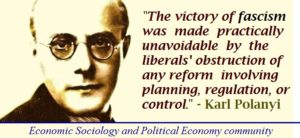Karl Polanyi was born on October 25, 1886, in the capital of the Austro-Hungarian Empire, Vienna. He founded the Galileo circle at the University of Budapest and actively participated along with a group of intellectuals to emancipate the potential of Social Science which had an immense impact on the Hungarian intellectual life. In 1908, Polanyi earned his Doctorate in Philosophy and by 1912, had graduated in law.

He was one among the founders of the Hungarian radical party in 1914 and served as its Secretary. During this period, he had to join the Austro-Hungarian Army as a cavalry officer for the first world war. But soon he had to quit and once again got actively engaged in the political activities. Soon, for political reasons, he had to flee Hungary. In Vienna, he worked as a journalist, writing a commentary on the economic and political issues for 10 years and met his wife, Ilona Duczynska.
By the 1930s, Polanyi emigrated to England to work for the journal co-existence and then in 1940, he moved to the United States as a professor of economics at the Columbia University until 1953. He worked as an economic historian, economic sociologist, political leader, historical sociologist, philosopher, political economist and economic anthropologist in his life until his death on April 23, 1964.
- His major contribution lies towards the economic anthropology through his book The Great transformation considered as a classic of sociological thought. He worked on the development of an overall view of the functioning of the economic relationships within different social models. He argues about the emergence of market-based societies in Europe and opposed traditional economic thought.
- He wrote three books on the market economy as a special form of social organization. The Great transformation (1944) was based on the 19th Century market economy. Polanyi emphasized that this type of market economy had no long-term future since it was socially divisive. He concentrated on the non-market forms of society developed a conceptual model for non- market economies in his work; Trade and Markets in the early Empires (1957). He studied the economic structure of the slave-exporting state in Dahomey and the slave trade (1966).
- He attempted to lay the framework for the general theory of comparative economics that would have all economies of past and present.
- He found a cultural approach to economics emphasizing how economies are embedded in society and culture. This approach known as substantive is popular in anthropology, political science, economic history, and economic sociology but counters mainstream economics.
- Prior to the 19th century, according to him the economic system in society was not based on market principles of exchange but rather on relationships. He viewed the economic process not as causal but responsive to social change.
THE GREAT TRANSFORMATION
- The Great Transformation is an account of the ups and downs that occurred in the market society. It depicts the enclosure process and the formation of the new economic system in the nineteenth century
- Through this work, he insists that England’s transition to market society from commercialized society was neither inevitable nor the result of an evolutionary process.
- It tells about the conflict between the imperatives of the capitalistic world economy and the pursual of social welfare within the nation-states.
- Exchange, redistribution, and reciprocity have always existed in different social institutional forms but during the 19th century, across the West, the structuring principle of the society changed to the price mechanism and profit motive rather than deliberation and dialogues of diverse social interest and concerns as land, labor and money gradually became commodities.
- Polanyi criticizes the classical economists for their averment that humanity’s nature was to” barter, truck and exchange”. The principle of division of labor leading to the market economy is considered as “a fallacy “and “almost entirely apocryphal” in his book.(Polanyi 1944,pp.44 -45).
- He says that today’s theories of the economy and Society rest upon the false claims by the classics and the concept of market weaken the principles of humanity.
- By commoditizing goods, labor and land the disembedded market economy of England threatened to remove the “protective covering of cultural institutions” leaving common people “to Perish from the effects of social exposure”. (Polanyi 1944,72-3).
- He believed that market society was socially and ecologically unsustainable as well as undesirable. He emphasized the need for a planned socialist economy through the book.
His ideas and approach unusual to the economic research laid the foundation for new lines of research for the anthropologists. He established a significant impact on economic history and anthropology by creating a different way of thinking about economies and societies.
Polanyi is regarded as the father of the concept of embeddedness; which means that the economy is immersed in social relations and it cannot be a separate field of the society as a whole.
He ignored the social change brought about by liberalism as well as the equality under freedom and liberal progress and used democracy in a way making the market mutually antithetic and vilifying liberals along with democracy.
Although he asked the right questions but failed in giving them the right answers when he said that markets did not have an important role in earlier human societies.
Yet, his work remains an important contribution towards Social Sciences as well as a valuable guide to the economic history of Human Development.
Source:
http://www.newworldencyclopedia.org
https://www.britannica.com/biography
We believe in sharing knowledge with everyone and making a positive change in society through our work and contributions. If you are interested in joining us, please check our ‘About’ page for more information
